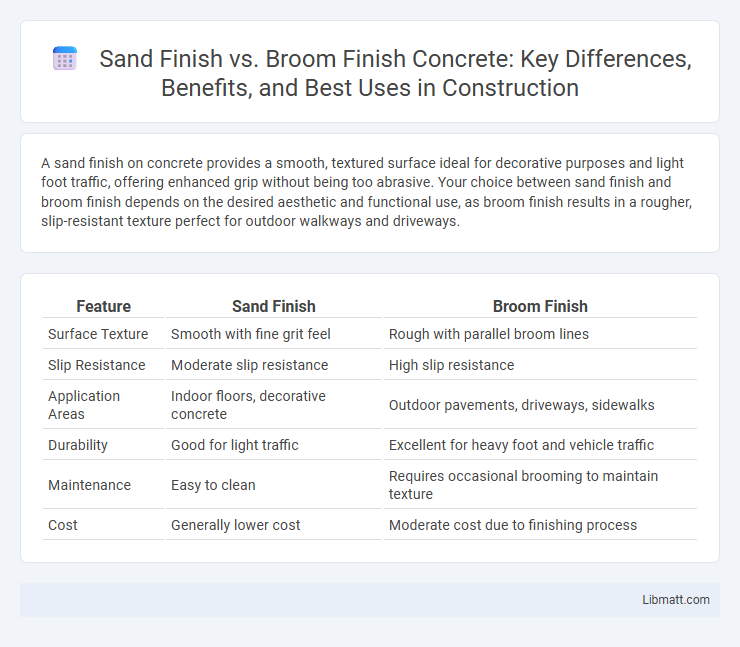A sand finish on concrete provides a smooth, textured surface ideal for decorative purposes and light foot traffic, offering enhanced grip without being too abrasive. Your choice between sand finish and broom finish depends on the desired aesthetic and functional use, as broom finish results in a rougher, slip-resistant texture perfect for outdoor walkways and driveways.
Table of Comparison
| Feature | Sand Finish | Broom Finish |
|---|---|---|
| Surface Texture | Smooth with fine grit feel | Rough with parallel broom lines |
| Slip Resistance | Moderate slip resistance | High slip resistance |
| Application Areas | Indoor floors, decorative concrete | Outdoor pavements, driveways, sidewalks |
| Durability | Good for light traffic | Excellent for heavy foot and vehicle traffic |
| Maintenance | Easy to clean | Requires occasional brooming to maintain texture |
| Cost | Generally lower cost | Moderate cost due to finishing process |
Introduction to Concrete Finishes
Concrete finishes significantly impact both the aesthetic appeal and functional performance of surfaces. Sand finish provides a smooth, matte texture ideal for decorative purposes and pedestrian areas, while broom finish offers enhanced slip resistance through its coarse, textured surface, making it suitable for driveways and walkways. Selecting the appropriate finish depends on desired traction, durability, and visual requirements in construction projects.
What is Sand Finish Concrete?
Sand finish concrete features a smooth, textured surface achieved by applying fine sand during the finishing process, enhancing slip resistance and aesthetic appeal. This type of finish provides a matte look that is less abrasive than broom finish, making it ideal for patios, walkways, and decorative applications. Your choice of sand finish concrete ensures a comfortable, durable surface perfect for both residential and commercial projects.
What is Broom Finish Concrete?
Broom finish concrete is a surface treatment created by dragging a broom across freshly poured concrete to produce a textured, non-slip surface ideal for outdoor applications like driveways and walkways. This finish enhances traction and safety by providing subtle grooves that minimize the risk of slips during wet conditions. Your choice between sand finish and broom finish depends on whether you prioritize smooth aesthetics or practical slip resistance.
Visual Differences: Sand Finish vs Broom Finish
Sand finish concrete displays a smooth, uniform texture with a subtle, fine-grain appearance that enhances aesthetic appeal for pathways and decorative surfaces. Broom finish features distinct, textured lines created by dragging a broom over wet concrete, providing slip resistance ideal for driveways and sidewalks. Understanding these visual differences helps you select the best finish for functional and design purposes.
Surface Texture and Slip Resistance
Sand finish concrete features a smooth, fine texture achieved by lightly brushing the surface with sand, providing moderate slip resistance suitable for indoor and decorative applications. Broom finish concrete displays a rougher, grooved surface created by dragging a broom across the wet concrete, significantly enhancing slip resistance for outdoor walkways, driveways, and pool decks. The choice between sand finish and broom finish directly impacts safety and traction, with broom finish offering superior grip in wet or high-traffic environments.
Durability and Maintenance Comparison
Sand finish concrete offers a smoother surface that is less porous, leading to improved durability against wear and easier maintenance due to reduced dirt accumulation. Broom finish concrete provides enhanced slip resistance but may trap debris in its textured grooves, requiring more frequent cleaning to maintain safety and appearance. Your choice between the two should balance durability needs with maintenance commitment based on the specific application environment.
Cost Considerations for Each Finish
Sand finish concrete typically costs more due to the additional labor involved in achieving a smooth, fine texture, while broom finish is generally more economical because it requires less time and simpler tools to create its textured surface. The choice between sand finish and broom finish may affect your budget depending on project scale, with sand finish increasing expenses for decorative or high-traffic areas and broom finish reducing costs for functional or outdoor spaces. Evaluating your project's aesthetic goals and durability needs will help determine the most cost-effective concrete finishing option.
Best Applications for Sand Finish Concrete
Sand finish concrete offers a smooth, textured surface ideal for residential driveways, patios, and indoor flooring where slip resistance and aesthetic appeal are important. It provides better traction than polished concrete, making it suitable for walkways and pool decks. This finish is also favored for stamped concrete projects to enhance visual depth without compromising durability.
Best Applications for Broom Finish Concrete
Broom finish concrete is ideal for outdoor surfaces that require enhanced slip resistance, such as driveways, sidewalks, patios, and pool decks. Its textured surface improves traction, making it safer for areas exposed to moisture or heavy foot traffic. Choose a broom finish to ensure your concrete provides durability and safety in high-traffic or wet environments.
Choosing the Right Finish: Factors to Consider
Selecting between sand finish and broom finish concrete depends on factors such as desired texture, slip resistance, and aesthetic appeal. Sand finish offers a smoother, more refined surface suitable for patios and decorative applications, while broom finish provides enhanced traction ideal for driveways and walkways. Your choice should prioritize safety requirements, maintenance ease, and the functional environment where the concrete will be used.
Sand finish vs Broom finish (concrete) Infographic

 libmatt.com
libmatt.com